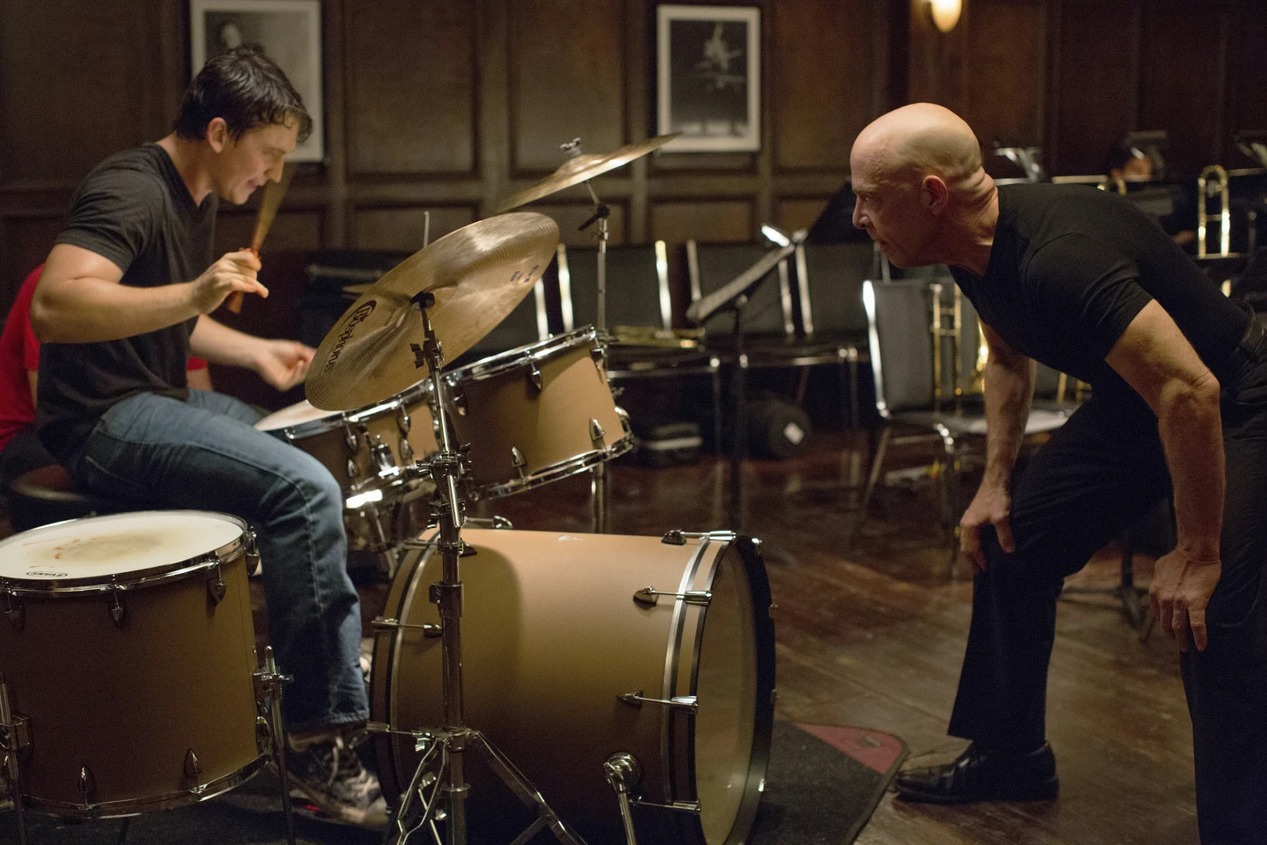 Sony Pictures Classic
Sony Pictures Classic
“There are no two words more harmful in the English language than ‘good job’,” jazz instructor Terence Fletcher (J.K Simmons) tells his student Andrew Neiman (Miles Teller) in one of his barked pep talks. Fletcher’s intolerance for merely “getting things done,” played by Simmons with a terrifying mix of intensity and rage, underpins Whiplash, back in theaters this month as it celebrates its tenth anniversary. Director Damien Chazelle’s feature debut is a portrait of toxic ambition and drive masquerading as a music movie, and remains an electrifying insight into the physical and mental toll people place on themselves and others.
Military-like in his approach to guiding students at Shaffer, a fictional elite New York City music conservatory, Fletcher throws insults at his students and, in one stand-out scene, hurls a chair at Neiman for “rushing” his drums rather than dragging them. Neiman, like his tutor, is also driven to reach perfection and his mission to improve and meet the high standards spirals into obsession. Over the course of the tightly-strung movie, he becomes bloodied and increasingly isolated in his punishing quest.
Chazelle, who wrote the script based on his experiences in a "very competitive" jazz band in high school, directs the action like a classic sports movie. Large sections of the movie play out like a Rocky training montage but with drums instead of boxing gloves. It makes for a dizzying cinematic experience as the muscle memory leads you to want Neiman to become the best drummer he can be and meet Fletcher’s approval, while reality reminds you that just keeping the tempo is all that is required of this young amateur.
The movie doesn’t shy away from the abusive nature of Fletcher’s methods. The parents of another student are pursuing legal action against him after their son hanged himself, believing that his toxic and belittling training methods led to his depression. He ultimately loses his job at the conservatory and begins playing at a local jazz club (Chazelle’s disdain for touristy jazz bars, here presented as a punishment, would continue in his next movie, La La Land, where Ryan Gosling’s character drinks himself into a stupor while playing piano for couples on first dates.) Being a jazz purist is its own arms race, though, and a rare Whiplash pan upon its release declared the movie’s “very idea of jazz” as “a grotesque and ludicrous caricature.” Writing in the New Yorker, Richard Brody claimed “the movie has no music in its soul — and, for that matter, it has no music in its images.”
In truth, Whiplash is about personal ambition and the dangers of trying to please a perfectionist. Like the tech guys inspired by The Social Network or finance bros who worship The Wolf of Wall Street, you can imagine a certain conservative demographic of viewers holding up Fletcher as a tough but necessary taskmaster, the kind of leader required to coax brilliance out of the ordinary. These figures still exist, you only have to look back to 2022 and Elon Musk’s message that Twitter would need to be “extremely hardcore" in order to succeed, demanding that staff work 80+ hour weeks, for proof. You can almost picture Fletcher being idolized by the manosphere if Whiplash was released today, with his tribunal verdict held up as proof that work ethic is vanishing from society.
What those people would be missing, though, is that Fletcher’s way of teaching is led by the standards he sets for himself and not the disdain he has for others. He regales students with an apocryphal story of the time Jo Jones threw a cymbal at Charlie Parker’s head and pushed him to the point at which he ceased being just another jazz musician and transcended into the man they called Bird. Fletcher’s belief is that there would be no Birds if there were no Joneses to push them. Simmons stops the character from being a mere bully by centering his belief in using pressure as a means to elicit great art. It’s not enough to justify his means, but a decade on watching these two butt heads chasing that same high remains a pure shot of cinematic adrenaline.